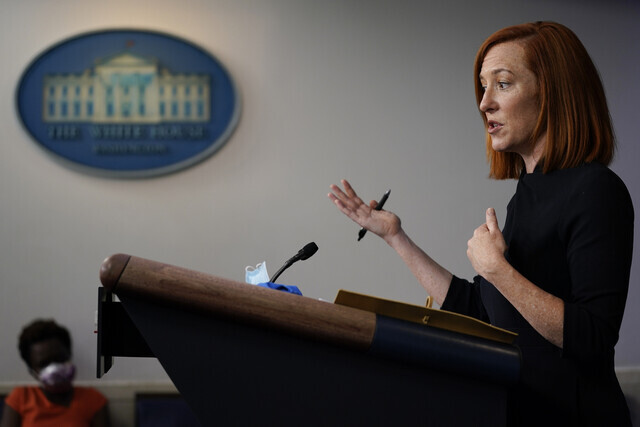hankyoreh
Links to other country sites 다른 나라 사이트 링크
[Editorial] S. Korea’s role in the US’ N. Korea policy just got more important

The White House has announced plans to work with its allies to develop a “new strategy” on the North Korean nuclear issue.
On Jan. 22, White House Press Secretary Jen Psaki said, “[President Joe Biden’s] view is, of course, that it is without question that North Korea’s nuclear ballistic missile and other [nuclear] proliferation-related activities constitute a serious threat to the international peace and security of the world.”
Psaki also stressed that Washington “still [has] a vital interest in deterring North Korea.”
“We will adopt a new strategy to keep the American people and our allies safe,” she continued, adding that the “approach will begin with a thorough policy review of the state of play in North Korea, in close consultation with South Korea, Japan, and other allies.”
Coming three days after the Biden administration took office, this was the first official statement of its position on North Korea policy. It read as a continuation from Secretary of State-designate Tony Blinken’s remarks in his confirmation hearing last week about reviewing the “entire approach and policy toward North Korea.”
It seems clear that the Biden administration is favoring a bottom-up approach based on working-level negotiations and a multilateral approach of cooperation with allies, rather than the top-down approach the Donald Trump administration adopted with its emphasis on direct negotiations between heads of state. At the same time, the specifics of this “new strategy” have not been finalized. This only underscores the need for the South Korean government to coordinate with the Biden administration.
In that sense, it comes as welcome news that discussions between South Korean and US authorities have gotten off to a swift start. According to the White House, National Security Advisor Jake Sullivan had a 40-minute phone conversation with Blue House Office of National Security Director Suh Hoon on Jan. 23, during which he “stressed the Biden administration’s commitment to further strengthening the US-ROK alliance.”
The South Korean and US defense ministers also spoke over the telephone on Jan. 24, reaffirming the close cooperation between the two sides’ defense authorities.
With its emphasis on clearing away the vestiges of the Trump administration, the Biden administration’s focus on North Korea policy and working-level talks is a long way from the sort of swift resumption of the Korean Peninsula peace process that Seoul has been envisioning. North Korea has also called for new proposals from the US, announcing at its Workers’ Party of Korea (WPK) Congress that it planned to “approach the US on the principle of power for power and goodwill for goodwill.”
There is the chance that we could see a battle of wills between the two sides, which leads to a show of force from North Korea and rising tensions. As a first step, we will need to hurry up and hold discussions on what to do about the South Korea-US joint military exercises currently scheduled for March.
Besides the North Korean nuclear issue, there are also a lot of other matters for South Korea and the US to work out together. We will need to closely analyze and respond to the Biden administration’s Indo-Pacific strategy and its policies on China. The foreign affairs and national security team should make thorough preparations for Presidents Moon Jae-in and Joe Biden to coordinate closely and quickly on matters, both over the telephone and at a summit.
Please direct comments or questions to [english@hani.co.kr]

Editorial・opinion
![[Column] Season 2 of special prosecutor probe may be coming to Korea soon [Column] Season 2 of special prosecutor probe may be coming to Korea soon](https://flexible.img.hani.co.kr/flexible/normal/500/300/imgdb/original/2024/0426/3317141030699447.jpg) [Column] Season 2 of special prosecutor probe may be coming to Korea soon
[Column] Season 2 of special prosecutor probe may be coming to Korea soon![[Column] Park Geun-hye déjà vu in Yoon Suk-yeol [Column] Park Geun-hye déjà vu in Yoon Suk-yeol](https://flexible.img.hani.co.kr/flexible/normal/500/300/imgdb/original/2024/0424/651713945113788.jpg) [Column] Park Geun-hye déjà vu in Yoon Suk-yeol
[Column] Park Geun-hye déjà vu in Yoon Suk-yeol- [Editorial] New weight of N. Korea’s nuclear threats makes dialogue all the more urgent
- [Guest essay] The real reason Korea’s new right wants to dub Rhee a founding father
- [Column] ‘Choson’: Is it time we start referring to N. Korea in its own terms?
- [Editorial] Japan’s rewriting of history with Korea has gone too far
- [Column] The president’s questionable capacity for dialogue
- [Column] Are chaebol firms just pizza pies for families to divvy up as they please?
- [Column] Has Korea, too, crossed the Rubicon on China?
- [Correspondent’s column] In Japan’s alliance with US, echoes of its past alliances with UK
Most viewed articles
- 1After election rout, Yoon’s left with 3 choices for dealing with the opposition
- 2Two factors that’ll decide if Korea’s economy keeps on its upward trend
- 3Why Kim Jong-un is scrapping the term ‘Day of the Sun’ and toning down fanfare for predecessors
- 4Noting shared ‘values,’ Korea hints at passport-free travel with Japan
- 5AI is catching up with humans at a ‘shocking’ rate
- 6South Korea officially an aged society just 17 years after becoming aging society
- 7Korea’s 1.3% growth in Q1 signals ‘textbook’ return to growth, says government
- 8‘We must say no’: Seoul defense chief on Korean, USFK involvement in hypothetical Taiwan crisis
- 9Exchange rate, oil prices, inflation: Can Korea overcome an economic triple whammy?
- 10Japan officially says compensation of Korean forced laborers isn’t its responsibility